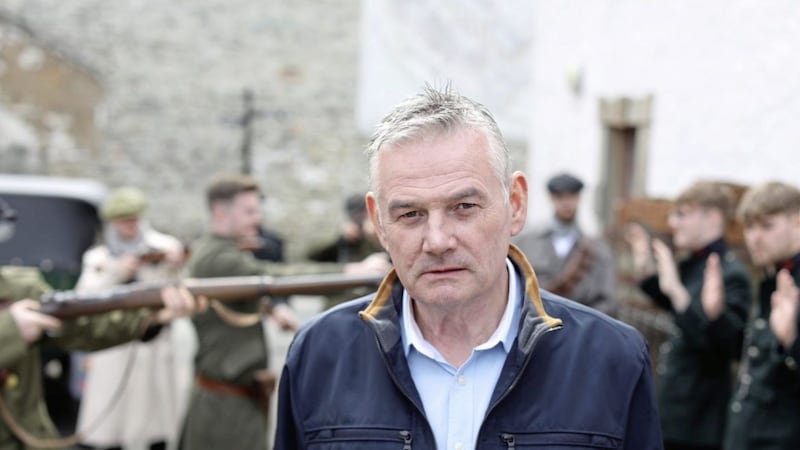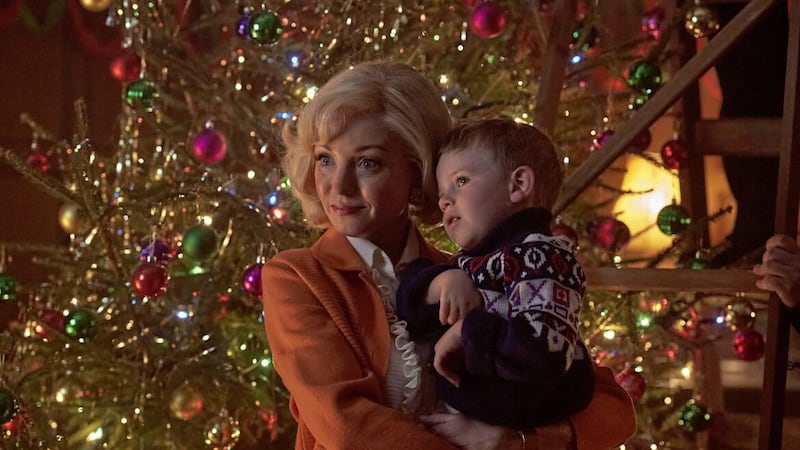"THIS film could have been made in any language – it just happens to be made in Irish because that's what most of the people who are in it are speaking," explains Kevin Magee of Lá i 1916, his most recent foray into factual film-making 'as Gaeilge'.
This new hour-long documentary finds the former BBC investigative journalist unearthing the fascinating and largely unknown stories behind a hugely significant moment in Irish history – the first Royal Irish Constabulary (RIC) officer to be killed during the Easter Rising in 1916.
On Easter Monday 1916, Co Donegal-born RIC man Charles McGee was fatally shot in Castlebellingham in Co Louth following a confrontation with Irish Volunteers. A British Army officer from Belfast, 2nd Lieutenant Robert Dunville – sole heir to the city's then world-renowned Dunville Whiskey empire – was also badly wounded in the incident, which left McGee lying dead in the street as the Volunteers made off for the GPO in Dublin in hijacked vehicles.
In the 105 years since his death, Charles McGee's name has become a mere footnote in our troubled history – at least for those not related to this Catholic native Irish speaker, who hailed from the tiny island community of Inishbofin in the Co Donegal Gaeltacht.
In 2016, a plaque marking the centenary of McGee's death was erected on the island, not somewhere you would generally expect to find a tribute to a fallen RIC man.
During Lá i 1916, Magee sets out to discover the true story of who Charles McGee was, what exactly transpired on that fateful day in 1916 – including who actually shot 'Charlie' – and why it has remained shrouded in mystery ever since.
He pieces together the stories which have been passed down though the generations in the families of McGee, Dunville and the two Irish Volunteers at the centre of the fatal incident, Paddy McHugh and Seán MacEntee.
McHugh, from Co Louth, went on the run under the protection of Michael Collins and went on to be a key figure in the Irish War of Independence, while MacEntee – a Belfast-born republican from a family who owned the Crown Bar and other popular pubs – was actually arrested at the GPO during the Rising and would later enter politics, becoming Tanaiste in 1959.
Magee also scours the official records at Ireland's Bureau of Military History and consults Ireland's former state pathologist Dr Marie Cassidy in order to unpick confusing crime scene details with the benefit of modern forensic knowledge.
Key moments in the film include the staging of a dramatic reconstruction of what actually took place in Castlebellingham and a climactic meeting between the families of the slain RIC man and the chief suspect in his death, during which they share their respective perspectives on the tragedy.
"We filmed the reconstruction in Down County Museum in April during lockdown," explains Magee, who lives in Downpatrick.
"Some of the guys we used are members of the Saul football team – that's where my kids play Gaelic. I asked the manager to put it in their WhatsApp group that we were looking for extras.
"So the guy playing Paddy McHugh is actually the captain of the Saul football team, and my son and his mates are also in it as well. I must say I was delighted with it, I thought they did really well, the costumes and all were good and our director Méabh Fields did a fantastic job."
He adds: "This film has the feel of a drama-documentary, which is what I was trying to do from the outset. I really wanted to show what actually happened on that day.
"I was also very pleased with the ending. I worked on the Spotlight series Facing The Truth, which was about bringing perpetrators and victims who had been affected by the Troubles together.
"I've always been really interested in that theme of just how people react and interact after a conflict. With this programme, I wanted to try to find out how long has to pass between violent events and people having an understanding and a reconciliation of the past.
"It's now more than 100 years since Charles McGee was shot and you can see that the families were actually very comfortable talking to each other about it.
"I think, tragically, it takes generations for the emotion to be taken out of it a little bit. The families were still very respectful about what had happened, but it definitely seemed like there was a reconciliation at the end."
Magee is a fluent Irish-speaker himself who spent 15 years of his 27 year BBC career working for BBC NI's flagship investigative journalism series, Spotlight, before becoming BBC News NI investigations correspondent.
Lá i 1916 is Magee's third documentary 'as Gaeilge' and represents a new chapter in a recent combination of key interests which brought him to a 'career crossroads' in 2020.
He explains: "I had made two BBC documentaries in Irish – one about a Nazi spy in the Donegal Gaeltacht in 1937 [Nazi sa Ghaeltacht] and one about the American artist Rockwell Kent who visited Glencolmcille in 1926 [Ar Lorg Annie].
"I became interested in trying to pursue making documentaries in Irish full-time, which is really why I made the decision to leave the BBC last year.
"Making a 59 minute documentary is a different kettle of fish than doing a two-and-a-half minute TV package, especially when you are making it in a second language, so it was a bit of a risk.
"But I've been so fortunate that it has worked out. I work now for a TV company called Clean Slate, for whom I've just finished Lá i 1916, and I have another three commissions to make three more docs in Irish, which I'm really thrilled about."
He adds: "What I am trying to do at the moment is to make programmes in Irish that aren't about Irish. You make a programme because the strength is in the story, and you make it in Irish because that's the genre you're working in.
"So I would hope that people will watch this documentary who have no interest in Irish, just like you would watch a good film even if it was in French."
Like many students who suffered through Irish at school, Magee had to find his own way back to the language before it really took root in his soul.
"I did an Irish A-level, then went to university in Dublin and more or less forgot about it," he tells me.
"But about 20 years ago, I did a diploma in Irish at Ulster University, and then I went there in the evenings and did a degree in Irish, from which I graduated two years ago.
"So [these films were] a case of, 'This is something you're interested in, you like the language, so why not combine it with making documentaries?'. Hopefully, for the next while, I'll be able to keep doing that."
:: Lá i 1916, Sunday October 10, 9.45pm, BBC Two. Find Kevin on Twitter at @KevinMageeBeeb








